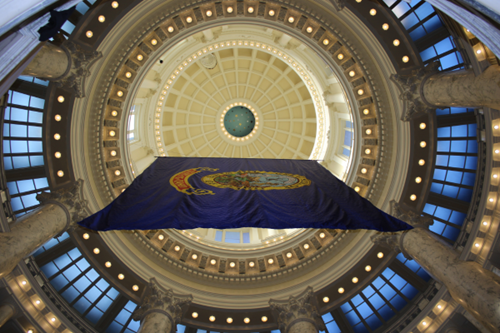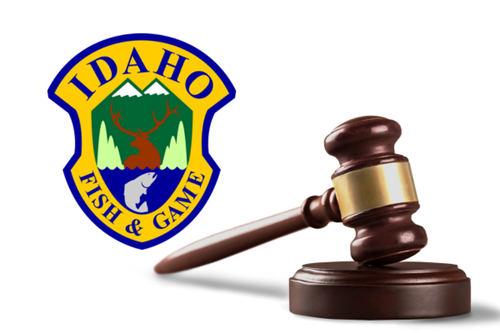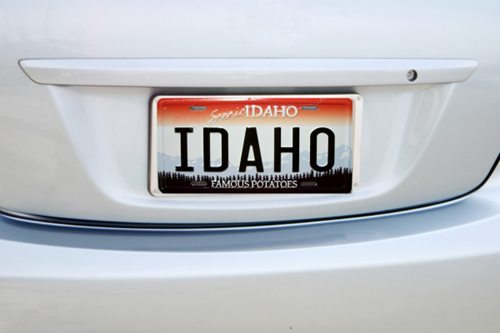Capitol Reflections: 2024 Session, Issue 3
By: Idaho Farm Bureau Governmental Affairs
“Of all tyrannies, a tyranny sincerely exercised for the good of its victims may be the most oppressive. It would be better to live under robber barons than under omnipotent moral busybodies. The robber baron’s cruelty may sometimes sleep, his cupidity may at some point be satiated; but those who torment us for our own good will torment us without end for they do so with the approval of their own conscience.” - C. S. Lewis
Commercial Driving Bills Introduced
 Two bills were introduced concerning commercial driving. H412 amends Idaho law that requires all trucks to stop at ports of entry and allows the Idaho Department of Transportation (ITD) to implement efficient methods, whether procedural or technological, that allow trucks to bypass ports. Some of this technology is already operational, thanks to a pilot program initiated by ITD at high-traffic ports of entry a few years ago. The implemented measures include scales on interstate roads and license plate scanners. These technologies work in tandem, checking for weight, registration and permits before the truck even reaches the off-ramp. Additionally, tire pressure sensors are in place at select ports of entry which detect low pressure, allowing drivers to exit, inspect for leaks and fill their tires. This technology helps reduce fuel consumption and minimizes time wasted time for truckers. AFBF Policy 128.1 says “we support…developing the most economical and energy efficient methods of meeting future transportation needs.” Idaho Farm Bureau believes this legislation helps achieve that policy.
Two bills were introduced concerning commercial driving. H412 amends Idaho law that requires all trucks to stop at ports of entry and allows the Idaho Department of Transportation (ITD) to implement efficient methods, whether procedural or technological, that allow trucks to bypass ports. Some of this technology is already operational, thanks to a pilot program initiated by ITD at high-traffic ports of entry a few years ago. The implemented measures include scales on interstate roads and license plate scanners. These technologies work in tandem, checking for weight, registration and permits before the truck even reaches the off-ramp. Additionally, tire pressure sensors are in place at select ports of entry which detect low pressure, allowing drivers to exit, inspect for leaks and fill their tires. This technology helps reduce fuel consumption and minimizes time wasted time for truckers. AFBF Policy 128.1 says “we support…developing the most economical and energy efficient methods of meeting future transportation needs.” Idaho Farm Bureau believes this legislation helps achieve that policy.
The second bill, H414, introduces two significant changes. Firstly, it extends the renewal period for commercial driver’s licenses (CDLs) from four to eight years. Additionally, the bill offers a five-dollar discount for online license renewals. The aim is to enhance efficiency by enabling drivers to maintain their CDLs for a longer duration and eliminate the need to visit a county DMV for renewal. AFBF policy 125.1.61. supports these changes.
Limiting Length of Special Sessions
 After citizens recently amended the Idaho Constitution to allow the legislature to call itself back into session under narrowly crafted circumstances, it was discovered that the time limitation that applies to extraordinary sessions called by the Governor, do not apply to legislatively called special sessions.
After citizens recently amended the Idaho Constitution to allow the legislature to call itself back into session under narrowly crafted circumstances, it was discovered that the time limitation that applies to extraordinary sessions called by the Governor, do not apply to legislatively called special sessions.
The legislature is now proposing an amendment to the Idaho Constitution that would ensure the 20-day limit that applies to extraordinary sessions called by the Governor will also apply to special sessions that the legislature calls.
Senate Joint Resolution 104 would place on the ballot the question: "Shall Section 23, Article III of the Constitution of the State of Idaho be amended to provide that no extraordinary or special session of the Legislature shall continue for a period longer than twenty days?"
The Senate State Affairs Committee, chaired by Senator Jim Guthrie (R-Inkom) held a hearing on the resolution Friday morning. The resolution was approved unanimously and will now be considered by the entire Senate before moving to the House for consideration. SJR 104 is sponsored by Senator Mark Harris (R-Soda Springs).
To amend the constitution, the resolution must be approved by a 2/3 majority of the members of both the House and the Senate. Once approved by the legislature, the language would appear on the ballot in November where it must be approved by a simple majority of voters.
IFBF policy #128 states: “All special sessions should be limited to 20 days.” IFBF supports SJR 104.
Idaho Farm Bureau Member Appointed to Fish and Game Commission
 On January 24, Governor Brad Little announced the appointment of Brody Harshbarger to the Idaho Fish and Game Commission. The commission's responsibilities include overseeing the Department of Fish and Game, budget setting for legislative approval and setting regulations and controls for fishing, hunting, trapping and wildlife management in accordance with the state's wildlife policy. Mr. Harshbarger is a resident of Squirrel, Idaho and has been an active member of the Fremont County Farm Bureau Board. He is a dryland farmer and cattle producer. He also hunts upland and big game animals. IFBF is pleased to have such a dynamic representative of agriculture and Idaho fish and wildlife. More information about the appointment can be found HERE.
On January 24, Governor Brad Little announced the appointment of Brody Harshbarger to the Idaho Fish and Game Commission. The commission's responsibilities include overseeing the Department of Fish and Game, budget setting for legislative approval and setting regulations and controls for fishing, hunting, trapping and wildlife management in accordance with the state's wildlife policy. Mr. Harshbarger is a resident of Squirrel, Idaho and has been an active member of the Fremont County Farm Bureau Board. He is a dryland farmer and cattle producer. He also hunts upland and big game animals. IFBF is pleased to have such a dynamic representative of agriculture and Idaho fish and wildlife. More information about the appointment can be found HERE.
Rules Review
 This week, both the House and Senate Agricultural Affairs Committees spent a significant portion of their meeting time reviewing agency rules. Most of the rules were scheduled for review as part of Governor Little’s Zero Based Rules (ZBR) Executive Order, which established a regular schedule for every rule to be thoroughly reviewed.
This week, both the House and Senate Agricultural Affairs Committees spent a significant portion of their meeting time reviewing agency rules. Most of the rules were scheduled for review as part of Governor Little’s Zero Based Rules (ZBR) Executive Order, which established a regular schedule for every rule to be thoroughly reviewed.
As part of the ZBR review process, each agency initiates by notifying stakeholders and the public of the review schedule for each rule along with alerting them of opportunities to provide input. The agency then updates the rules based on stakeholder/public feedback and administrative efforts to make sure the rules are relevant and fulfilling their intended purposes. Once the rules have been updated, they go before the legislature for review and final approval.
In addition to the ZBR process, other proposed rules also have to go before the legislature for approval before they are able to go into effect. Last year, the legislature passed H206a, which required that a proposed rule must be approved by both the House and Senate before it becomes effective. Previously to the bill’s passage, only one chamber was required to approve a proposed rule before it went into effect. IFBF policy long supported making that change.
Farm Bureau participated in the public/stakeholder meetings held by ISDA over the late spring/early summer of last year. It was a good opportunity to review many of these governing rules on a much closer basis and to get further clarity from the agency on how specific programs really work.
For a complete list and review of all the pending rules being considered by the House and Senate Agricultural Affairs committees, visit this link: https://adminrules.idaho.gov/legislative_books/2024/pending/24S_AgAffs.pdf
We express our gratitude to ISDA for the open and transparent way they conducted the rule review process over the past year, and to the legislature for their diligent processes of inspection and approval of these rules. Since rules carry the full weight and effect of law, it is important that they are reviewed often by policy makers and the regulated community to make sure they are fulfilling their intended purposes.
IFBF Policy #150 states our support of a complete review of existing regulations to determine their effectiveness and appropriateness prior to assigning more restrictive regulations. We also support a peer review of the existing regulations to determine their potential to mitigate the problems they address.
Repealing Mandated Purchase of New License Plates
 For years citizens have complained about Idaho’s law which requires the purchase of new license plates every ten years regardless of whether the old plates were damaged or not. There have been multiple attempts by legislators over the years to repeal this requirement, and each time they were shot down through heavy lobbying from law enforcement (who claimed that they could not effectively read old plates) and 3M, the manufacturer of the reflective film that covers license plates (who claimed they could not guarantee the reflective properties of plates for more than seven years).
For years citizens have complained about Idaho’s law which requires the purchase of new license plates every ten years regardless of whether the old plates were damaged or not. There have been multiple attempts by legislators over the years to repeal this requirement, and each time they were shot down through heavy lobbying from law enforcement (who claimed that they could not effectively read old plates) and 3M, the manufacturer of the reflective film that covers license plates (who claimed they could not guarantee the reflective properties of plates for more than seven years).
This year, it appears there is new hope that the mandatory license plate purchase law will finally be repealed. H413 has been introduced into the House Transportation & Defense Committee, chaired by Rep Joe Palmer (R-Meridian). H413 would “remove the requirement to replace license plates every 10 years.” The difference this year is that the bill is supported by the Governor’s office and is sponsored by the Idaho Transportation Department.
According to the statement of purpose for the bill: “Due to the increased cost of aluminum and other goods, the cost of the license plate program is increasing. These increased costs could lead to increased customer prices for license plates. By allowing a customer to retain legible plates for more than 10 years, this change will mitigate potential future increases in plate costs.”
Perhaps there is one very small silver lining in the dreadful effects of the out-of-control inflation we have been forced to bear over the past few years. If history is a guide, the repeal of the mandatory license plate purchase law may not have been supported by the Governor’s office if it were not for the huge increase in the cost of the materials and producing the plates.
ITD had the sense to realize that citizens were likely to complain loudly if they tried to increase the cost of plates in the future, so they wisely decided it was time to scrap the law requiring perfectly good plates to be replaced.
This is not an issue that Farm Bureau will be engaging in this session as we have no policy on license plates, but it illustrates the point that given the right incentives, even the government can make the right choice, eventually. If being forced to purchase license plates every ten years whether you needed new ones or not has been a pet peeve of yours over the years, you might consider contacting your legislators about H413.
------------------------------------------------------------------------------------
Resources Available to Follow During Session:
Legislative Website Homepage: HERE
2024 Legislative Session Bill Center: HERE
List of Senate Committee Assignments: HERE
List of House Committee Assignments: HERE
Current Senate Committee Agendas: HERE
Current House Committee Agendas: HERE
Watch Committee Meetings and Floor Sessions Live: HERE
Governor’s Bill Action and Legislative Communications: HERE
Still can't find what you are looking for? Find by topic:
- Achievement Award (YF&R)
- Actions Alerts
- Advocacy
- Ag Ambassadors
- American Farm Bureau
- American Farm Bureau Policy Book
- Archive Photos
- Articles
- Board of Directors
- Calendar - State/District
- Calendar - County
- Capitol Reflections
- Collegiate Chapters
- Committee Application Form
- Commodities
- Convention Annual
- County Presidents & Board Information
- County Resource Page
- Delegate Form
- Discount Programs
- Discussion Meet
- Discussion Meet - High School
- Education Programs
- Events
- Excellence Award (YF&R)
- Expense Voucher
- Flickr
- Gem State Producer
- High School Discussion Meet
- High School Speech Contest
- Hope in Idaho Ag
- House of Delegates Credentials Form
- IFBF Board of Directors
- IFBF Policy Book
- IFBF Staff
- Insurance
- Legislative Action Program
- Legislative Issues
- Library
- MAC Trailer
- Magazines
- Map My Benefits
- Member Benefits
- Member Discount
- Membership Application
- Mission Statement
- Moving Agriculture to the Classroom
- Newsletter Sign up
- News Releases
- News Room
- Open Range Law
